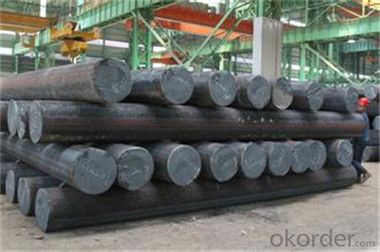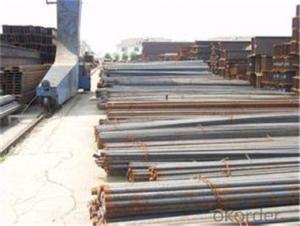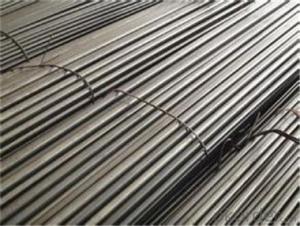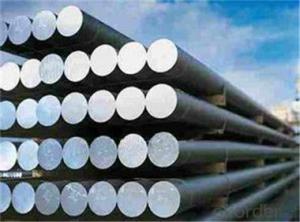Hot Rolled Steel Round Bars Bearing Steel from China
- Loading Port:
- Tianjin
- Payment Terms:
- TT OR LC
- Min Order Qty:
- 900 m.t.
- Supply Capability:
- 2000000 m.t./month
OKorder Service Pledge
OKorder Financial Service
You Might Also Like
Description of steel round bar:
1. Commodity: Round steel bar
3. Technical: Hot rolling
2. Length: Min. 5.8meter, according to requirement.
3. Diameter: 16mm-250mm
5. Packing: In Bundle or according to your requirements.
Festures of steel round bar:
1.Dia 80-800mm Length:2000-13000mm or as required
2.Technique:Forged
3.Delivery Time:45 days
Specifications of steel round bar:
1. Commodity: Round steel bar
3. Technical: Hot rolling
2. Length: Min. 5.8meter, according to requirement.
3. Diameter: 16mm-250mm
Mild Steel Round Bar is used for making security grills, screens, Construction and Machine Manufacture.Stainless steel bar is widely used in Architecture,Machine Manufacture,Power Station,Electric Equipment and Factory,Oil and Chemical Industry,Food and Medical Industry,
City Decoration Industry
Images of coffee machine:

FAQ:
1. What is your package?
Packing situation: standard seaworthy packing or as customer required.
2. How long is the lead time?
Delivery time: 45 days after order confirmed.
3. What payment term do you accept?
Payment: T/T or L/C at sight.
- Q:Are steel round bars suitable for bearing applications?
- Yes, steel round bars are suitable for bearing applications. They offer high strength, durability, and excellent load-bearing capabilities, making them commonly used in various industries such as automotive, construction, and machinery.
- Q:How are steel round bars stored?
- Steel round bars are typically stored in a way that ensures their safety and easy access. One common method of storage is to stack the bars horizontally on a pallet or rack system. The bars are often bundled together and secured with straps or wire to prevent them from rolling or shifting. Another approach is to store them vertically in racks, with each bar placed in a designated slot to prevent any contact or damage. In both cases, it is important to maintain proper spacing between the bars to allow for adequate air circulation and to prevent any potential corrosion. Additionally, steel round bars should be stored in a dry and covered area to protect them from moisture, dust, and other environmental elements. Proper labeling and inventory management systems are also crucial to ensure easy identification and retrieval of the bars when needed.
- Q:How do steel round bars compare to concrete round bars?
- There are several notable distinctions between steel round bars and concrete round bars. To begin with, steel round bars are composed of a robust and long-lasting material, while concrete round bars are made from a composite material containing cement, aggregates, and water. This dissimilarity in materials grants steel round bars a higher tensile strength and resistance to bending and deformation in contrast to concrete round bars, which are more susceptible to cracking and breaking under stress. Additionally, steel round bars provide greater flexibility in terms of design and customization. They can be easily molded, bent, and trimmed to specific lengths and dimensions, making them highly versatile for various applications. Conversely, concrete round bars are typically available in standard sizes and shapes, thereby limiting their design possibilities. Another crucial aspect to consider is weight. Steel round bars generally have a lighter weight compared to concrete round bars, rendering them easier to handle and transport. This weight advantage also results in reduced structural loads, allowing for more efficient and cost-effective construction. In regard to corrosion resistance, steel round bars necessitate additional protective measures such as coatings or galvanization to prevent rust and corrosion, particularly in humid or marine environments. Conversely, concrete round bars possess natural resistance to corrosion. This factor can significantly influence the long-term durability and maintenance requirements of a structure. Lastly, cost is a pivotal factor to take into account. Although steel round bars may entail a higher initial material cost compared to concrete round bars, their superior strength and durability can result in long-term cost savings. Concrete round bars may require more frequent maintenance and repairs, which can accumulate over time. In conclusion, steel round bars offer superior strength, flexibility, and durability in comparison to concrete round bars. However, the choice between the two is contingent upon the specific requirements of the project, including factors such as design flexibility, weight considerations, corrosion resistance, and cost.
- Q:What is the elasticity of a steel round bar?
- The elasticity of a steel round bar refers to its ability to return to its original shape after being subjected to external forces or deformation. Steel is known for its high elasticity, meaning it can withstand significant stress and strain without permanent deformation. This property makes steel round bars suitable for various applications, including construction, manufacturing, and engineering.
- Q:Can steel round bars be used in the manufacturing of architectural features?
- Yes, steel round bars can certainly be used in the manufacturing of architectural features. Steel is a versatile and durable material that can be shaped and formed into various architectural elements such as columns, beams, handrails, and decorative features. Its strength and resistance to corrosion make it suitable for both structural and decorative purposes in the construction of buildings and other architectural designs.
- Q:What are the advantages of using mild steel round bars?
- There are several advantages of using mild steel round bars in various applications. Firstly, mild steel round bars have excellent strength and durability. They are able to withstand high amounts of stress and pressure, making them suitable for use in construction, manufacturing, and engineering projects. The strength of mild steel round bars ensures that they do not easily deform or break under heavy loads, providing a reliable and long-lasting solution. Secondly, mild steel round bars have good weldability. They can be easily joined or attached to other materials through welding, making them versatile in different applications. This allows for easy customization and flexibility in design, as the bars can be shaped and connected to create complex structures or components. Additionally, mild steel round bars have a low carbon content, making them more cost-effective compared to other types of steel. They are readily available and affordable, making them a popular choice in various industries. Moreover, mild steel round bars have good machinability. They can be easily cut, drilled, and shaped using common machining techniques, allowing for easy fabrication and customization. This makes them suitable for a wide range of applications, from construction to automotive components. Lastly, mild steel round bars have good corrosion resistance. While they may not be as corrosion-resistant as stainless steel, they still offer adequate protection against rust and other forms of corrosion. This makes them suitable for outdoor applications or environments with high humidity or exposure to moisture. In summary, the advantages of using mild steel round bars include their excellent strength and durability, good weldability, cost-effectiveness, machinability, and corrosion resistance. These factors make them a reliable and versatile choice for various industrial and construction applications.
- Q:How are steel round bars manufactured?
- Steel round bars are manufactured through a process known as hot rolling. This process starts with heating a large steel billet in a furnace until it becomes soft and malleable. The billet is then passed through a series of rollers which compress and shape it into a round bar. The first step in hot rolling is the roughing mill, where the billet is passed through multiple sets of rollers to reduce its thickness and increase its length. This process also helps to ensure that the steel maintains a consistent temperature throughout. After the roughing mill, the bar enters the finishing mill, where it is further reduced in size and given its final shape. The finishing mill typically consists of several sets of rollers that gradually decrease the diameter of the bar while increasing its length. This process is repeated until the desired dimensions are achieved. During the rolling process, the steel round bar is constantly monitored for quality control. Any imperfections or defects that may arise are detected and corrected to ensure the final product meets the required specifications. Once the bar reaches its final dimensions, it is cooled and cut to the desired length. The cooling process can be done using air, water, or a combination of both. After cooling, the bar is inspected for any surface defects and undergoes further processing if necessary. In some cases, additional treatments such as heat treatment or surface finishing may be applied to enhance the properties and appearance of the steel round bar. Overall, the manufacturing of steel round bars involves a combination of heating, rolling, cooling, and cutting processes to produce a high-quality product that meets the specific requirements of various industries.
- Q:Are steel round bars suitable for marine environments?
- Yes, steel round bars can be suitable for marine environments, especially if they are made from corrosion-resistant alloys such as stainless steel. These alloys have high resistance to corrosion, making them suitable for prolonged exposure to saltwater and other harsh marine conditions. However, regular carbon steel round bars may be prone to rusting in marine environments and may require additional protective measures such as coatings or regular maintenance to prevent corrosion.
- Q:How do steel round bars compare to concrete round bars?
- Steel round bars are typically stronger and more durable than concrete round bars. Steel has a higher tensile strength and can withstand greater loads and stresses. Concrete round bars, on the other hand, are more commonly used for their resistance to corrosion and fire. Both materials have their own advantages and applications, but steel round bars are generally preferred for their superior strength and versatility in various construction projects.
- Q:Can steel round bars be used for making jewelry?
- Yes, steel round bars can be used for making jewelry, particularly for creating bold and industrial-style pieces. However, steel may not be as popular as other metals such as gold, silver, or stainless steel for traditional or delicate jewelry designs.
1. Manufacturer Overview |
|
|---|---|
| Location | |
| Year Established | |
| Annual Output Value | |
| Main Markets | |
| Company Certifications | |
2. Manufacturer Certificates |
|
|---|---|
| a) Certification Name | |
| Range | |
| Reference | |
| Validity Period | |
3. Manufacturer Capability |
|
|---|---|
| a)Trade Capacity | |
| Nearest Port | |
| Export Percentage | |
| No.of Employees in Trade Department | |
| Language Spoken: | |
| b)Factory Information | |
| Factory Size: | |
| No. of Production Lines | |
| Contract Manufacturing | |
| Product Price Range | |
Send your message to us
Hot Rolled Steel Round Bars Bearing Steel from China
- Loading Port:
- Tianjin
- Payment Terms:
- TT OR LC
- Min Order Qty:
- 900 m.t.
- Supply Capability:
- 2000000 m.t./month
OKorder Service Pledge
OKorder Financial Service
Similar products
New products
Hot products































